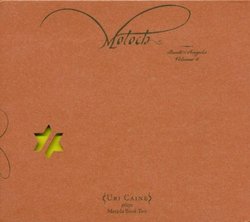| All Artists: Uri Caine Title: Moloch: Book of Angels 6 Members Wishing: 1 Total Copies: 0 Label: Tzadik Original Release Date: 1/1/2006 Re-Release Date: 11/21/2006 Genres: Folk, International Music, Jazz, Special Interest, New Age, Pop, Classical Styles: Avant Garde & Free Jazz, Historical Periods, Modern, 20th, & 21st Century Number of Discs: 1 SwapaCD Credits: 1 UPC: 702397736028 |
Search - Uri Caine :: Moloch: Book of Angels 6
 | Uri Caine Moloch: Book of Angels 6 Genres: Folk, International Music, Jazz, Special Interest, New Age, Pop, Classical
|
Larger Image |
CD Details |
CD ReviewsLengthy solo piano performance. Michael Stack | North Chelmsford, MA USA | 12/22/2006 (3 out of 5 stars) ""Moloch" is the sixth volume of music released from John zorn's Masada Book II: The Book of Angels, performed this time around by pianist Uri Caine in solo context. Caine is a New York pianist who, like Dave Douglas, lives musically in that grey area between downtown and uptown jazz (and for that matter, between jazz and classical traditions). Eclectic composer John Zorn's Masada project, by way of introduction, was originally composed as a fusion of different traditions in Zorn's life-- his jazz roots and his Jewish roots, as a songbook for a quartet. A decade later and 200 songs or so later in the book for Masada, Zorn sat down over a few months to compose the second book, some 300 (!) new pieces for Masada-- brief themes written using the "Jewish scales" that could serve as a vehicle for individual or collective improvisation. He titled each song after an angel (hence "The Book of Angels") and decided rather than use a single group as a vehicle to present this music, he'd instead have different groups perform volumes of these recordings.
Before going any further, let me point out that I am a fan of zorn's, not necessarily of Caine's. While his playing is always breathtaking in its flexibility, style, and virtuosity, something about him has never attracted me. It could be that invariably I've rarely found classical forms to be nearly as satisfying as jazz, particularly with regard to piano performance, and while Caine may work in both idioms, he always sounded like a classical player first and a jazz player second to me. Nonetheless, I find my opinion of this record tempered by that. The recording is no less than 19 cuts (totally nearly 78 minutes) of solo piano performances of Masada pieces, ably executed by Caine pretty much universally in a style that relies on circular left hand technique and a fluid, right hand approach, with the two hands working more as a pair of voices than one. His technique is flawless, but his style exposes the self-imposed limitations Zorn placed on himself with the Masada songbook. Sticking to a small set of scales is going to render a certain sameness quality in the pieces, and adding to this what seems a tendency by Caine to introduce his own style on top of this and a general sameness of performance, you end up with what can be reduced to 78 minutes of pretty much the same thing, and for me, it starts to blend into the background. Now mind you, this isn't entirely fair, but the only piece that stylistically stands out is "Segef", a frantic piece that Caine decides to take as a unison of left and right hand rather than having the two of them offset each other. Accentuating this is a tendency for the pieces to bounce back and forth between faster and slower pieces, creating a up-and-down tempo bounce that lends a rhythmic emphasis on the sameness of composition and technique. That's not to say, mind you, that there's not a number of great moments on here-- Zorn's brief compositions, while limited in form, can often be things of staggering emotion and/or power, and Caine often brings this to bear, be it the sensitivity, gentleness and underlying despair of "Sabriel" or the pounding, circular "Rimmon" (which both opens and closes the record) or a number of other pieces on the record (galloping "Jerazol", dramatic, energetic and frantic but never cutting loose "Ubaviel", or classically Masada ballad "Kebriel" all spring immediately to mind). It's just that 19 pieces is a lot, and it feels a bit like a marathon. Having said all this, I have a funny feeling that a large portion of the audience of this record will love it a lot more than I did. I certainly don't regret my purchase of it, but "Moloch" is not one that I'm reaching for a lot." |

 Track Listings (19) - Disc #1
Track Listings (19) - Disc #1